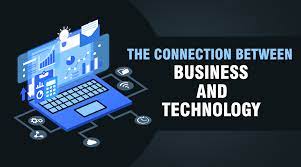The Impact of Business Technology on Modern Enterprises
In today’s fast-paced and competitive business landscape, technology plays a crucial role in shaping the success and growth of enterprises. From small startups to large corporations, businesses are increasingly relying on advanced technologies to streamline operations, enhance productivity, and stay ahead of the competition.
One of the key benefits of integrating technology into business processes is improved efficiency. Automation tools, data analytics software, and cloud computing services enable companies to automate repetitive tasks, analyse vast amounts of data in real-time, and access resources from anywhere in the world. This not only saves time and reduces costs but also allows employees to focus on more strategic tasks that drive innovation and growth.
Furthermore, technology has revolutionised communication within organisations. Email, instant messaging apps, video conferencing tools, and collaborative platforms have made it easier for teams to communicate and collaborate regardless of their physical location. This has led to increased productivity, faster decision-making processes, and improved teamwork.
Moreover, the adoption of advanced technologies such as artificial intelligence (AI), Internet of Things (IoT), blockchain, and virtual reality has opened up new opportunities for businesses to create innovative products and services. AI-powered chatbots provide instant customer support, IoT devices enable predictive maintenance in manufacturing plants, blockchain ensures secure transactions in financial services – the possibilities are endless.
However, with great power comes great responsibility. As businesses become more reliant on technology, they also face new challenges such as cybersecurity threats, data privacy concerns, and digital transformation complexities. It is essential for enterprises to invest in robust cybersecurity measures, comply with regulations like GDPR, and adapt their business models to embrace digital transformation.
In conclusion, business technology is a driving force behind the success of modern enterprises. By leveraging the latest technological innovations effectively and responsibly, businesses can improve efficiency, enhance communication, foster innovation, and ultimately achieve sustainable growth in today’s digital age.
The Five Most Prevalent Types of Business Technology
The Advantages of Implementing Business Technology
4. The Triad of Technological Categories in Modern Business
- What is business technology and their functions?
- What are the 5 most common types of business technology?
- What are the benefits of business technology?
- What are the three types of technology in business?
What is business technology and their functions?
Business technology refers to the use of various tools, systems, and solutions to enhance the efficiency, productivity, and overall performance of a business. The functions of business technology encompass a wide range of activities, including but not limited to automating processes, managing data and information effectively, improving communication within the organisation and with external stakeholders, enabling better decision-making through data analytics, enhancing customer experience through digital platforms, ensuring cybersecurity and data protection measures are in place, and fostering innovation through the adoption of emerging technologies. In essence, business technology serves as a cornerstone for modern enterprises to stay competitive, adapt to changing market dynamics, and drive sustainable growth in an increasingly digitalised world.
What are the 5 most common types of business technology?
In the realm of business technology, the question “What are the 5 most common types of business technology?” is frequently asked by individuals seeking to understand the fundamental tools and systems that drive modern enterprises. The five most common types of business technology include customer relationship management (CRM) software for managing customer interactions, enterprise resource planning (ERP) systems for integrating core business processes, cloud computing services for flexible and scalable data storage, cybersecurity solutions to protect sensitive information, and communication tools such as email and video conferencing for seamless collaboration. These technologies form the backbone of many successful businesses, enabling them to operate efficiently, securely, and competitively in today’s digital landscape.
What are the benefits of business technology?
Business technology offers a myriad of benefits to enterprises across various industries. From enhancing operational efficiency and streamlining processes to improving communication and fostering innovation, the advantages of integrating technology into business operations are vast. Automation tools help businesses save time and reduce costs by automating repetitive tasks, while data analytics software enables real-time insights for informed decision-making. Cloud computing services provide flexibility and scalability, allowing companies to access resources from anywhere in the world. Overall, the benefits of business technology are clear: increased productivity, enhanced competitiveness, and opportunities for growth and innovation in today’s fast-paced digital landscape.
What are the three types of technology in business?
In the realm of business technology, there are three main types of technologies that play a crucial role in driving efficiency and innovation within enterprises. The first type is communication technology, which encompasses tools and platforms that facilitate seamless communication and collaboration among employees, clients, and stakeholders. This includes email systems, video conferencing software, instant messaging apps, and project management tools. The second type is productivity technology, which consists of software and tools designed to streamline workflows, automate tasks, and enhance productivity. Examples include project management software, customer relationship management (CRM) systems, and office productivity suites. Lastly, there is infrastructure technology, which refers to the hardware and software that form the backbone of a business’s IT infrastructure. This includes servers, networking equipment, cloud computing services, cybersecurity solutions, and data storage systems. By leveraging these three types of technology effectively, businesses can optimise their operations and stay competitive in today’s digital landscape.

Leave a Reply